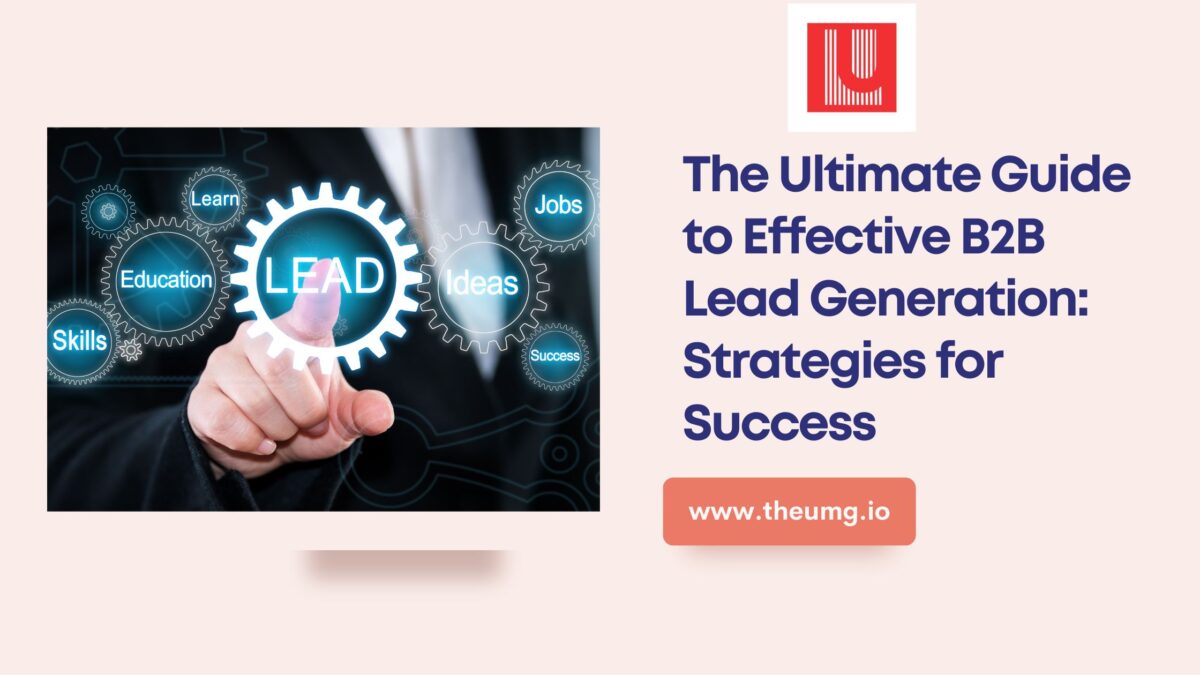The Ultimate Guide to Effective B2B Lead Generation: Strategies for Success

In the ever-evolving landscape of business-to-business (B2B) marketing, lead generation stands as the cornerstone of success. Whether you’re a seasoned marketer or just diving into the world of B2B, mastering lead generation is essential for driving growth and securing valuable business opportunities. In this comprehensive guide, we’ll explore the strategies, tactics, and best practices that constitute effective B2B lead generation in 2024 and beyond.
Understanding B2B Lead Generation
Before delving into specific strategies, it’s crucial to grasp the essence of B2B lead generation. Unlike business-to-consumer (B2C) marketing, where the focus is often on attracting large volumes of individual consumers, B2B lead generation targets businesses as potential customers. A lead in the B2B context refers to a company or individual who has expressed interest in a product or service and has the potential to become a paying customer.
Defining Your Ideal Customer Profile (ICP)
The foundation of successful B2B lead generation lies in understanding your target audience. Start by creating an Ideal Customer Profile (ICP) that outlines the characteristics of your ideal customers. Consider factors such as industry, company size, location, pain points, and buying behavior. By clearly defining your ICP, you can tailor your lead generation efforts to attract prospects who are most likely to convert into customers.
Leveraging Content Marketing
Content marketing plays a pivotal role in B2B lead generation by providing valuable information and resources to potential customers. Create high-quality content that addresses the pain points and challenges faced by your target audience. This could include blog posts, whitepapers, case studies, eBooks, and webinars. By offering valuable insights and solutions, you position your brand as a trusted authority in your industry, attracting qualified leads in the process.
Harnessing the Power of Search Engine Optimization (SEO)
In the digital age, having a strong online presence is essential for B2B lead generation. Optimizing your website and content for search engines can significantly enhance your visibility and attract organic traffic. Conduct keyword research to identify relevant search terms and incorporate them strategically into your content. Additionally, focus on technical aspects such as site speed, mobile-friendliness, and user experience to improve your search engine rankings and drive more qualified leads to your website.
Embracing Social Media Marketing
Social media platforms offer immense opportunities for B2B lead generation and brand engagement. Identify the social channels where your target audience is most active and establish a presence on those platforms. Share valuable content, engage with your audience, and participate in relevant industry conversations. Additionally, consider leveraging paid advertising options such as LinkedIn Ads to target specific demographics and drive qualified leads to your website.
Implementing Account-Based Marketing (ABM)
Account-Based Marketing (ABM) is a strategic approach that focuses on targeting and nurturing high-value accounts through personalized campaigns. Identify key accounts that align with your ICP and develop tailored marketing strategies to engage decision-makers within those organizations. Personalization is key in ABM, whether it’s through customized content, targeted advertising, or personalized email outreach. By focusing your efforts on the most promising accounts, you can maximize your ROI and drive meaningful business outcomes.
Utilizing Marketing Automation
Marketing automation platforms streamline and automate various aspects of the lead generation process, allowing you to scale your efforts more efficiently. Implement lead scoring systems to prioritize and qualify leads based on their engagement level and readiness to buy. Nurture leads through automated email workflows that deliver relevant content at each stage of the buyer’s journey. Additionally, leverage data analytics to track and measure the effectiveness of your campaigns, allowing you to optimize your strategies for better results.
Cultivating Strategic Partnerships
Collaborating with complementary businesses and industry partners can open up new avenues for B2B lead generation. Identify potential partners whose products or services complement your own and explore opportunities for co-marketing initiatives. This could include joint webinars, co-authored content, or referral programs. By tapping into each other’s networks and resources, you can expand your reach and attract qualified leads from sources you may not have reached otherwise.
Conclusion
Effective B2B lead generation requires a strategic and multi-faceted approach that combines creativity, data-driven insights, and continuous optimization. By understanding your target audience, creating valuable content, leveraging digital channels, and embracing innovative tactics such as ABM and marketing automation, you can attract, nurture, and convert high-quality leads that drive sustainable growth for your business. Stay adaptable, keep experimenting, and always prioritize delivering value to your prospects, and success in B2B lead generation will follow suit.





